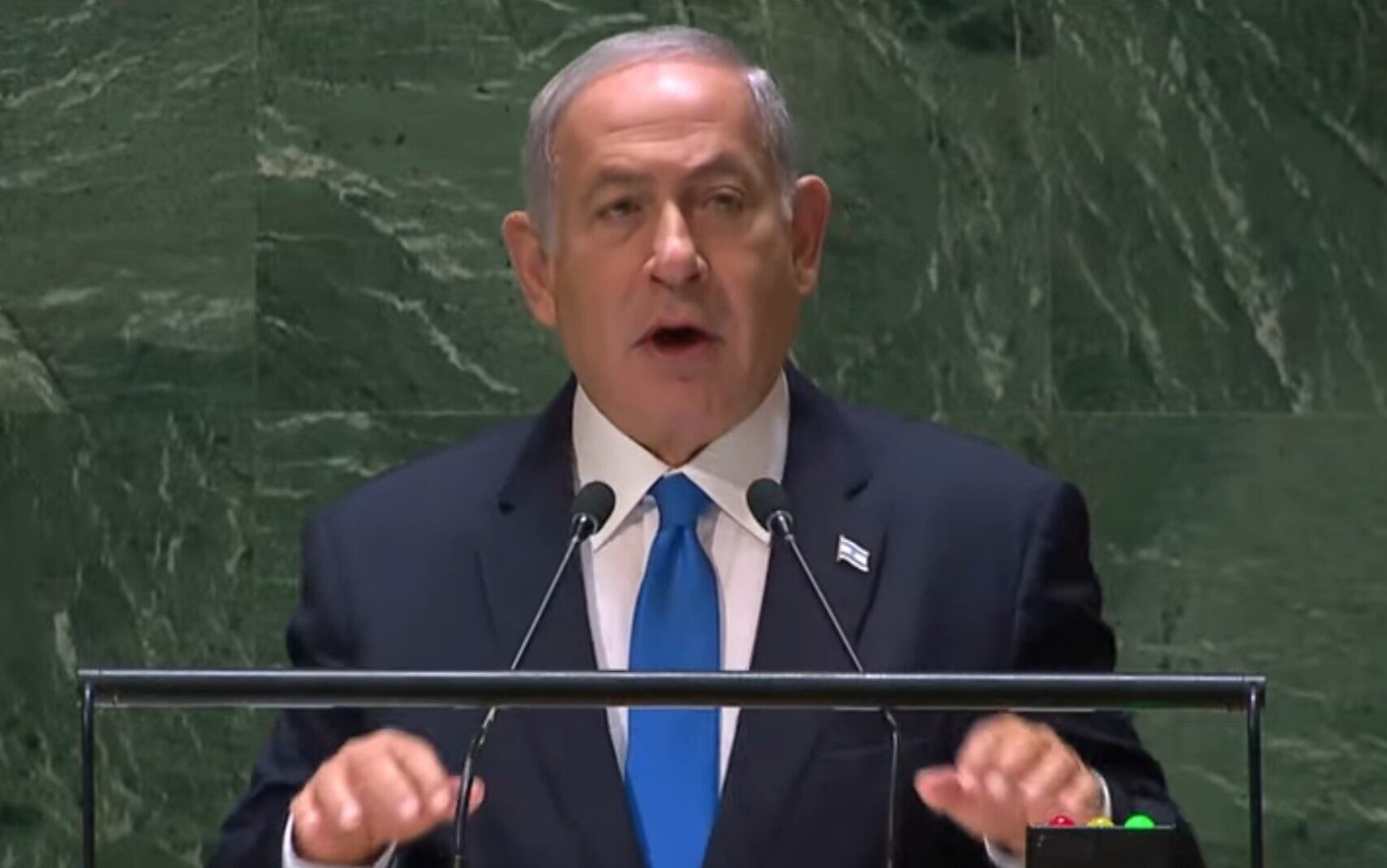Hamas Has Got to Go”: Israel PM Benjamin Netanyahu’s Fiery Speech at UNGA

United Nations General Assembly, New York – September 27, 2024 Israel PM Benjamin said
In a strongly worded address to the United Nations General Assembly, Israeli Prime Minister Benjamin Netanyahu reiterated his call for the international community to take decisive action against Hamas, labelling the Palestinian militant group a “terrorist organization” that “has got to go.”
Israel PM Benjamin Netanyahu’s Key Points:
- Condemning Hamas: Israel PM Benjamin Netanyahu denounced Hamas’s “unrelenting terror” and its exploitation of Gaza’s civilians as human shields.
- Iran’s Influence: He highlighted Iran’s significant role in supporting Hamas and other terrorist groups, destabilizing the region.
- Israel’s Right to Self-Defence: Israel PM Benjamin Netanyahu emphasized Israel’s duty to protect its citizens from Hamas’s rocket attacks and terror tunnels.
- International Action: He urged the international community to take concrete steps to dismantle Hamas’s military capabilities.
Full Transcript of Israel PM Benjamin Netanyahu’s Speech:
“Ladies and gentlemen, esteemed leaders, and representatives of the international community,
I stand before you today to address a pressing issue that threatens global stability and peace: the menace of Hamas. This terrorist organization has hijacked the Gaza Strip, exploited its citizens and using them as human shields.
Hamas’s ideology is rooted in hatred, extremism, and a relentless pursuit of destruction. Its rockets rain down on Israeli cities, its tunnels infiltrate our borders, and its terrorists slaughter innocent civilians.
But Hamas is not a lone actor. It receives substantial backing from Iran, the world’s leading state sponsor of terrorism. Tehran’s fingerprints are all over Gaza, fuelling the flames of violence.
Israel has the right to defend itself, and we will continue to take all necessary measures to protect our citizens. However, this burden should not fall solely on our shoulders.
The international community must take decisive action. We must dismantle Hamas’s military capabilities, disrupt Iran’s support networks, and hold accountable those who enable this terrorism.
The time has come to say it clearly: Hamas has got to go.
We cannot tolerate an organization that glorifies death, suppresses freedom, and destroys hope.
Let us unite in our quest for peace, security, and humanity.
Reactions from World Leaders:
- US President: “We support Israel’s right to self-defense and share concerns about Hamas’s terrorist activities.”
- EU Representative: “We condemn Hamas’s violence and urge all parties to work towards a peaceful resolution.”
- Palestinian Authority President: “Netanyahu’s speech is a distraction from Israel’s occupation and settlement expansion.”
Implications and Next Steps:
- International Pressure: The speech may increase pressure on the international community to take concrete actions against Hamas.
- Israeli-Palestinian Relations: Netanyahu’s words may further strain relations between Israel and the Palestinian Authority.
- Regional Stability: The address highlights the complex regional dynamics, emphasizing the need for a comprehensive approach to address terrorism.
Background Information:
- Hamas-Israel Conflict: Ongoing tensions between Israel and Hamas have led to periodic escalations and ceasefire agreements.
- Iran-Israel Rivalry: Iran’s support for Hamas and other proxy groups fuels regional tensions.
- UNGA’s Role: The United Nations General Assembly provides a platform for world leaders to address pressing global issues.
Hamas-Israel Conflict: Understanding the Complexities
The Hamas-Israel conflict is a longstanding and complex issue, rooted in historical, political, and religious tensions.
Historical Context
- 1948 Arab-Israeli War: The establishment of Israel led to the displacement of Palestinians.
- 1967 Six-Day War: Israel occupied the Gaza Strip and West Bank.
- 1987 First Intifada: Palestinians began resisting Israeli occupation.
Key Issues
- Territorial Disputes: Israel’s control over Gaza and the West Bank.
- Palestinian Statehood: Hamas’s demand for recognition as a sovereign state.
- Security Concerns: Israel’s concerns about Hamas’s terrorist activities.
Hamas’s Objectives
- Resisting Israeli Occupation: Ending Israel’s presence in Palestinian territories.
- Establishing Islamic State: Creating an Islamic state in Palestine.
- Liberating Jerusalem: Restoring Muslim control over Jerusalem.
Israel’s Objectives
- National Security: Protecting Israeli citizens from Hamas’s attacks.
- Border Security: Ensuring the security of Israel’s borders.
- Countering Terrorism: Preventing Hamas’s terrorist activities.
International Response
- UN Involvement: The United Nations Relief and Works Agency for Palestine Refugees (UNRWA) provides humanitarian aid.
- US Support for Israel: America’s commitment to Israel’s security.
- European Union’s Role: The EU’s efforts to promote diplomacy and stability.
Humanitarian Concerns
- Civilian Casualties: The impact on Palestinian and Israeli civilians.
- Displacement: The conflict’s effect on refugees and internally displaced persons.
- Humanitarian Aid: The need for international assistance.
Peace Process
- Two-State Solution: Establishing separate Israeli and Palestinian states.
- Negotiations: Direct talks between Israel and Hamas.
- International Mediation: Third-party facilitation of peace talks.
Conclusion
The Hamas-Israel conflict requires a comprehensive understanding of its historical, political, and religious contexts. Diplomatic efforts and international cooperation are crucial to resolving this complex issue.
Sources:
- Israeli Defense Forces (IDF)
- Hamas official statements
- United Nations News
- Reuters
- Associated Press
Important Terms:
- Intifada
- Occupation
- Terrorism
- Sovereignty
- Two-State Solution
Related Articles:
- “The History of the Israeli-Palestinian Conflict”
- “Hamas’s Rise to Power in Gaza”
- “Israel’s National Security Concerns”

Average Rating